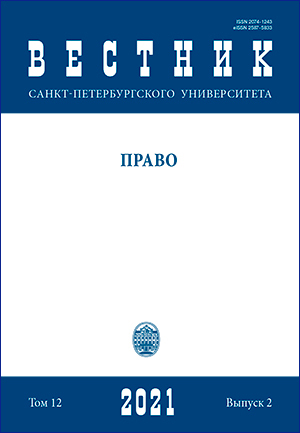Co-regulation as a way to improve the effectiveness of legal regulation in sports
DOI:
https://doi.org/10.21638/spbu14.2021.202Аннотация
In the article, the authors formulate a definition of co-regulation based on an overview of the approaches available in documents and regulations from the European Union. Co-regulation does not appear to be an intermediate form between state regulation and self-regulation, but rather an independent method of social regulation that can significantly improve legal regulation effectiveness. This is achieved by combining legal principles and norms and state control over their implementation with a broad discretion of professionals in a particular field. Sports is considered a classic case of co-regulation since all Russian sports federations pursue the legally defined goals (development of one or more sports in the Russian Federation, their promotion, organization, sporting events and training of athletes who are members of national sports teams), achieve these goals to realize the legally defined rights and obligations, and undergo evaluation for effectiveness and accreditation by the state. The article thoroughly analyzes the history of adopting a package of amendments to Russian legislation in order to introduce arbitral proceedings for athletes and coaches’ individual labor disputes in 2020. This example demonstrates the weaknesses of exclusive state regulation of legal relations in sports and the shortcomings of self-regulation. Specific problems are identified: their solutions are quite complicated when one has to choose one of the above-mentioned models or their combination, the status of “legionnaires”, duration of labor contracts, conditions for paying salaries and others. The arguments in favor of introducing a national arbitration for athletes and coaches’ labour disputes are considered. The status of Russian and international sports federations is studied in terms of their classification as self-regulatory organizations and the inconsistency of the independent status of sports organizations is demonstrated. In conclusion, the authors propose an amendment to the Federal Law on Physical Culture and Sports in the Russian Federation to legalize co-regulation in this area.
Ключевые слова:
self-regulation, co-regulation, legal relations in sports, labor disputes of athletes and coaches, arbitration, effectiveness of legal regulation
Скачивания
Библиографические ссылки
(In Russian)
Загрузки
Опубликован
Как цитировать
Выпуск
Раздел
Лицензия
Статьи журнала «Вестник Санкт-Петербургского университета. Право» находятся в открытом доступе и распространяются в соответствии с условиями Лицензионного Договора с Санкт-Петербургским государственным университетом, который бесплатно предоставляет авторам неограниченное распространение и самостоятельное архивирование.






